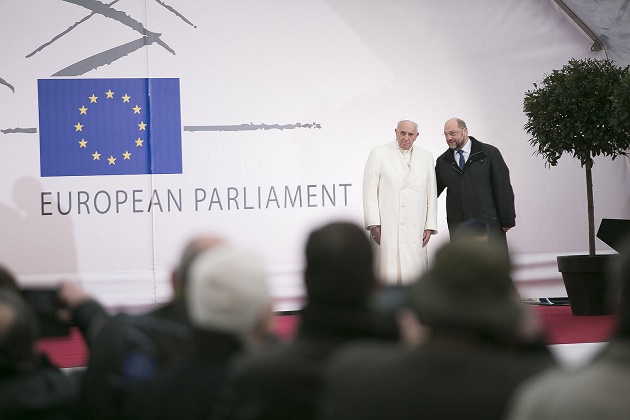With Pope Francis the Roman Catholic Church is simply becoming more “catholic”, i.e. embracing and absorbing all, without losing its being “Roman”.
 Pope Francis with German European Parliament Martin Schulz, in Strasbourg. / EPP (CC)
Pope Francis with German European Parliament Martin Schulz, in Strasbourg. / EPP (CC)
The recent commemoration of the Reformation (Lund, Sweden, 31 October 2016) is only the tip of the iceberg in Pope Francis’ ecumenical efforts.
His relentless activity in meeting with Christian leaders (from the patriarchs of Constantinople and Moscow to mainstream Protestant denominational leaders and several Pentecostal pastors) is a qualifying mark of his pontificate that is beginning to raise concerns inside the Catholic Church. His constant remarks about the need to speed the way towards unity appear to soften, if not downplay, the traditional conditions for such unity according to Rome.
Some Catholic critics are worried that the Pope seems to spend more time with non-Catholics than with people of his own church. Especially after his recent appreciation of Martin Luther, in an interview given to the Italian Catholic newspaper Avvenire (summarized in English, too) the blunt question was asked: is the Pope making the Catholic Church Protestant?
In Step with Vatican II
Rejecting the view according to which commemorating the Protestant Reformation was an unwarranted “forward flight”, Pope Francis defended his actions by referring to Vatican II as the framework for his ecumenical initiatives. No surprise: Vatican II (1962-1965) sought to re-orientate the ecumenical direction of the Roman Catholic Church by recognizing signs of the true church in other communities and by calling non-Catholics “separated brethren”. One of the goals of the Council was to encourage full unity among Christian churches and communities, all reconciled with the theological outlook and ecclesiastical structures of the Roman church. Nothing new under the sun then. What Francis is doing in the sphere of ecumenism was all prepared by and previewed at Vatican II. Each one in his own way, John XXII, Paul VI, John Paul II, and Benedict XVI, have tried to implement the ecumenical thrust of the Council. Francis confirms to be the Pope who without necessarily quoting Vatican II at length, perhaps embodies its “spirit” more than his predecessors.
More specifically, Francis makes reference to the 50 year old dialogue between the Roman Catholic Church and the Lutherans culminated in the 1999 Joint Declaration on justification signed under John Paul II under the leadership of then Cardinal Ratzinger. For Francis this document settles the main theological issues raised by the Reformation, paving the way for even fuller unity. After this landmark agreement, nothing of significance is left of the Reformation apart from regretful political attachments of self-referential churches that are entrenched in their past.
Parameters of Unity
The Pope rejects the idea that he is making his church more Protestant and appeals to Vatican II as the large theological canvas of which the Joint Declaration represents the new ecumenical fruit. He sees himself as standing in a long-term trajectory. Moreover, the fact that he approaches other Christian traditions and communities (e.g. the different bodies of Eastern Orthodoxy) with similar if not more intensive fervor indicates that he is not particularly attracted to Protestantism only. His ecumenical zeal goes even beyond the borders of Christianity and spills over to the world of religions and the secular world. He takes unity, i.e. Christian unity, as part of a larger goal that has to do with the unity of mankind.
Going back to the question about the Protestantization of the Catholic Church, there is a major argument running through Pope Francis’ assessment of the Reformation in the context of his ardent desire for unity. His interpretation of the history of the Reformation and its on-going significance de facto eliminates theology from the picture and replaces the driving force of unity with doing things together and praying together. In other words, Scripture alone (the Bible has supreme authority over the church), faith alone (salvation is a gift received by believing in Christ and trusting Him), and Christ alone (the whole Christian life is centered on Him) are nothing but relics of a distant past.
According to the Pope, the Roman Catholic Church has already absorbed these concerns and those who want to continue to wave the Reformation flag are seen as wanting to continue a power game based on church politics. Is this really the case? Of course, the Reformation had political overtones. However, as the recent statement Is the Reformation Over? – signed by dozens of evangelical theologians and leaders worldwide – argues, “In all its varieties and at times conflicting tendencies, the Protestant Reformation was ultimately a call to (1) recover the authority of the Bible over the church and (2) appreciate afresh the fact that salvation comes to us through faith alone”. These are standing and unresolved issues in the present-day relationship between Roman Catholics and evangelical Christians. Church politics, although inextricably interwoven, was not the main reason and is not the main legacy of the Reformation.
With Pope Francis the Roman Catholic Church is not becoming Protestant. It is simply becoming more “catholic”, i.e. embracing and absorbing all, without losing its being “Roman”. It is still embedded in the theological and institutional outlook that the Protestant Reformation called to renewal according to the Gospel.
Leonardo De Chirico, theologian, evangelical pastor and Director of the Reformanda Initiative.

Las opiniones vertidas por nuestros colaboradores se realizan a nivel personal, pudiendo coincidir o no con la postura de la dirección de Protestante Digital.
Si quieres comentar o